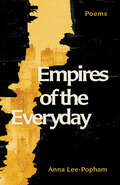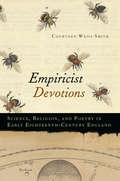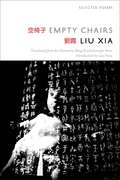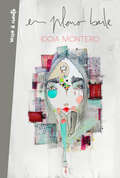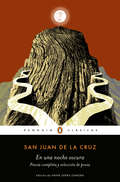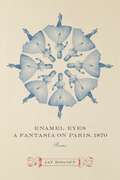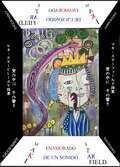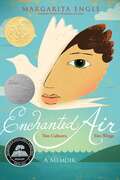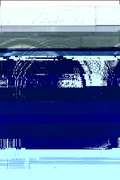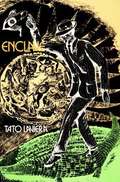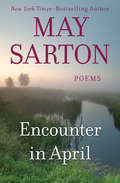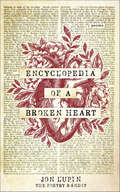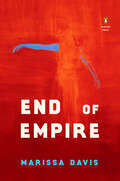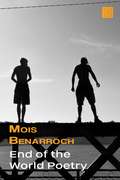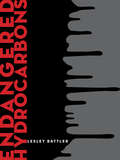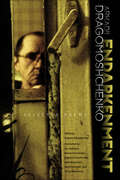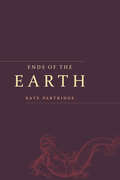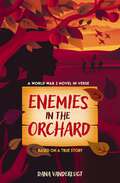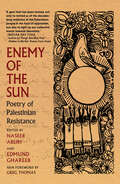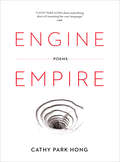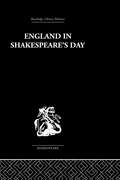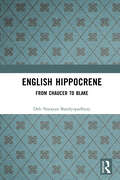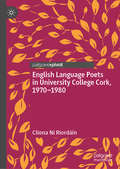- Table View
- List View
Emperor Babur's Prayer and other poems
by Sankha Ghosh Kalyan RayThe voices in Sankha Ghosh's poems are various and splendidly modulated. Many are reflective, several corrosive with irony, and some ache with music and in sensuality.
Empires of the Everyday: Poems
by Anna Lee-PophamAn ambitious and wholly original poetry collection that examines the ways that life is confined and sometimes defined by the city and the ubiquity and invisibility of state violence.The poems in Empires of the Everyday give voice to the many &“you&” who move through a city—one that resembles many modern cities—where plywood shelters are demolished in pandemic winters. Where everyday violence is palpable, but the related media reporting is offhand, cool, distanced, piecemeal, uncontextualized.In an attempt to access a more revelatory language, the poems spar with an AI translator, disturbing the disease of twenty-first century life that the city makes solid and covers up. Slavery, permanent war, and Empire titter in the resulting language, in its bending of what is possible, as only poetry can do. The poems trace the relationship between the human &“you&” and the machine &“I&” through five powerful, nuanced, and thought-provoking episodes. Anna Lee-Popham&’s impressive debut collection is immersed in the current ruptures of the world, rendering a translation of Empire and beyond-Empire to a possible convergence for &“you&” and &“I.&”
Empiricist Devotions: Science, Religion, and Poetry in Early Eighteenth-Century England
by Courtney Weiss SmithFeaturing a moment in late seventeenth- and early eighteenth-century England before the disciplinary divisions that we inherit today were established, Empiricist Devotions recovers a kind of empiricist thinking in which the techniques and emphases of science, religion, and literature combined and cooperated. This brand of empiricism was committed to particularized scrutiny and epistemological modesty. It was Protestant in its enabling premises and meditative practices. It earnestly affirmed that figurative language provided crucial tools for interpreting the divinely written world. Smith recovers this empiricism in Robert Boyle's analogies, Isaac Newton's metaphors, John Locke's narratives, Joseph Addison's personifications, Daniel Defoe's diction, John Gay's periphrases, and Alexander Pope's descriptive particulars. She thereby demonstrates that "literary" language played a key role in shaping and giving voice to the concerns of eighteenth-century science and religion alike. Empiricist Devotions combines intellectual history with close readings of a wide variety of texts, from sermons, devotional journals, and economic tracts to georgic poems, it-narratives, and microscopy treatises. This prizewinning book has important implications for our understanding of cultural and literary history, as scholars of the period's science have not fully appreciated figurative language's central role in empiricist thought, while scholars of its religion and literature have neglected the serious empiricist commitments motivating richly figurative devotional and poetic texts.Winner of the Walker Cowen Memorial Prize for an Outstanding Work of Scholarship in Eighteenth-Century Studies
Empty Chairs: Selected Poems
by Xia LiuThe first publication of the poetry of Liu Xia, wife of the imprisoned Nobel Peace Prize recipient Liu XiaoboI didn't have a chanceto say a word before you becamea character in the news,everyone looking up to youas I was worn downat the edge of the crowdjust smokingand watching the sky.A new myth, maybe, was formingthere, but the sun was so brightI couldn't see it. —from "June 2nd, 1989 (for Xiaobo)"Empty Chairs presents the poetry of Liu Xia for the first time freely in English translation. Selected from thirty years of her work, and including some of her haunting photography, this book creates a portrait of a life lived under duress, a voice in danger of being silenced, and a spirit that is shaken but so far indomitable. Liu Xia's poems are potent, acute moments of inquiry that peel back to expose the fraught complexity of an interior world. They are felt and insightful, colored through with political constraints even as they seep beyond those constraints and toward love.
En pleno baile
by Idoia MonteroIdoia Montero nos sorprende en este primer poemario con una compilación de textos maduros, llenos de imágenes, que nos hacen viajar desde la penumbra a la luz, desde el dolor a la esperanza. Todo ello acompañado de sus maravillosas ilustraciones. Imagina que no conoces el frío,imagina una bañera de hielo,imagina seguir bailando. En pleno baile es una mudanza, una frontera, un apagón de luz. Habla de la vuelta a casa, de lo que hay después de los golpes, de que un paso atrás no es una huida. Habla del amor y de sus trampas, de los atajos que no llevan al mar, de la defensa del silencio, de moldear la tristeza y la esperanza, de los comienzos y del tiempo límite, de la pérdida y de la evolución, de las visitas a uno mismo.
En una noche oscura: Poesía completa y selección de prosa
by San Juan De la CruzLos mejores libros jamás escritos. «Volé tan alto, tan alto,que le di a la caza alcance.» El halo de misterio y trascendencia que gira en torno a la obra de San Juan de la Cruz le ha convertido, junto a Santa Teresa de Jesús, en uno de los poetas místicos más representativos de nuestra tradición. Tanto su prosa como su breve obra poética han generado un sinfín de interpretaciones que abarcan desde los aspectos más puramente literarios hasta la profundidad filosófica de sus escritos. No es de extrañar, pues, que Dámaso Alonso le considerara el poeta más complejo de nuestra tradición cuando advirtió: «Dejémonos de Góngora. Las mayores dificultades de la poesía española nos las ofrece San Juan de la Cruz». La presente edición está a cargo de Anna Serra, doctora en humanidades y experta en la obra de San Juan de la Cruz. Su meticulosa selección de los escritos esenciales adentra al lector en el mundo e imaginario de esta gran figura del misticismo español.
Enamel Eyes, a Fantasia on Paris, 1870: Poems
by Jay RogoffIn lyric poetry with the dramatic sweep of a historical novel, Jay Rogoff’s Enamel Eyes, a Fantasia on Paris, 1870 reimagines “the terrible year” when the Franco-Prussian War shook the City of Lights. The great comic ballet Coppélia had dazzled Paris and Emperor Napoleon III mere weeks before war erupted; in retrospect, the ballet’s obsession with a mechanical woman anticipated the conflict’s mechanized violence. Using multiple voices and poetic forms, Rogoff skillfully recreates the wonder and horror of these months of siege through the eyes of both ordinary and famous Parisians. From political figures like Empress Eugénie and artists including Edgar Degas and Édouard Manet to sixteen-year-old Giuseppina Bozzacchi and other dancers in the premiere of Coppélia, the characters of Enamel Eyes bear witness to a surreal year that changed Paris and the lives of its citizens forever.
Enamorado de un sonido
by Maki StarfieldEsta colección toca todos los temas queridos por los poetas: naturaleza, amor, amistad, sueños, poesía, divinidad. Realmente podemos encontrarnos en estos poemas, tan simples y tan profundos al mismo tiempo. Podemos ocuparnos del alma delicada y soñadora de la poetisa y sentimos su corazón vibrar, mientras sus versos, estrofa tras estrofa, nos llevan al fondo de su alma, tan enamorada de la Vida. Fabrizio Legger (Postremo Vate) de la introducción.
Enchanted Air: Two Cultures, Two Wings: A Memoir (Enchanted Air Ser.)
by Margarita EngleIn this poetic memoir, which won the Pura Belpré Author Award, was a YALSA Nonfiction Finalist, and was named a Walter Dean Myers Award Honoree, acclaimed author Margarita Engle tells of growing up as a child of two cultures during the Cold War.Margarita is a girl from two worlds. Her heart lies in Cuba, her mother’s tropical island country, a place so lush with vibrant life that it seems like a fairy tale kingdom. But most of the time she lives in Los Angeles, lonely in the noisy city and dreaming of the summers when she can take a plane through the enchanted air to her beloved island. Words and images are her constant companions, friendly and comforting when the children at school are not. Then a revolution breaks out in Cuba. Margarita fears for her far-away family. When the hostility between Cuba and the United States erupts at the Bay of Pigs Invasion, Margarita’s worlds collide in the worst way possible. How can the two countries she loves hate each other so much? And will she ever get to visit her beautiful island again?
Enchantee
by Angie EstesThis is a collection of poetry from the renowned author whose poems are brimming with sounds and wordplay.
Encore
by Richard KinneyA small book of poems written by Richard Kinney dedicated to "my friends" and copyrighted in 1954
Encounter in April: Poems
by May SartonThe debut work of a literary legend May Sarton&’s career spanned sixty years and included novels, poetry, memoirs, and even children&’s books, but it was poetry that provided the world&’s first look at her wondrous talent. Encounter in April is a fitting starting point for readers wishing to familiarize themselves with one of the twentieth century&’s most lyrical and eloquent authors. In this anthology, Sarton describes womanhood devastatingly and unforgettably, deftly matching serene imagery with powerful emotion. Her sonnets are to be savored. Encounter in April is a thesis statement for a lengthy and profound career, and Sarton&’s talent is readily evident from the beginning.
Encyclopedia of a Broken Heart: Poems
by Jon LupinA collection of new poems on the themes of hurt, melancholy, and healing by Jon Lupin, the Poetry Bandit From the poet behind You Only Love Me When I'm Suffering comes a new collection of poetry that will shake you to the core. Organized in the format of an encyclopedia, each letter of the alphabet includes several poems on the theme of the word that begins with that letter. Emotional and inspiring, Encyclopedia of a Broken Heart will appeal to every modern poetry lover.
End of Empire (Penguin Poets)
by Marissa DavisFrom a prizewinning poet whose work &“points to an unfathomably bright future for the canon&” (Danez Smith), a stunningly lush collection about desire, resilience, and our fraught and ecstatic relationship with the natural worldA collection as remarkable for the force of its feeling as for the range of its vision, End of Empire explores the tensions of Black and American identity within an ecological framework. Inspired by the language and landscape of the poet&’s rural Kentucky hometown and the ways that inherited religious and political narratives shape our relationships with our surroundings and ourselves, these poems reckon with the ways the speaker, their body, and their natural and ideological surroundings continuously remake each other. Formally dynamic, emotionally resonant, and rich with biblical, mythological, and historical allusions, these are elegant, impeccably crafted pieces that evoke the fearsome power of nature and of the tangled, sensual self.
End of the World Poetry
by Mois BenarrochBrother Where are you my brother I loved Where are your beautiful feathers I wore Where are you my dazzling brother Where was your wisdom and where is your zest Where are you my brother and where are you headed Your life would go up and hatch into the sky Brother your life as a flame from a lion’s heart Where are you brother, where is my life Where are you brother, where’d you take the dream, my innocence In my manhood, my man, a lion roar, where did you take me With your disappearing years, with the mystery Come back to me brother, love me as I loved thee With the hope my love would save you love me back So my love would be innocent once again Brother love me Brother come back Life, oh… Wish of life, end of life The impossible end. I hear my children’s cry and I remember yours Cry of death, cry of weakness to life How can you possibly die at age eight Your life has been feathers which helped me to fly I hear my children cry, the crying of life And I ain't thrilled to be hearing them shout Your shout echoing in Jerusalem’s skies This Jerusalem which holiness didn’t save
Endangered Hydrocarbons
by Lesley BattlerFracking – tar-sand runoff – dirty oil extraction. This is the language of our oil-addicted 21st century society: incredibly invasive, blatant in its purpose, and richly embedded in mythological and archetypal symbolism. The ultimate goal of the industry: To core the underworld.Endangered Hydrocarbons, Lesley Battler's first full-length collection of poetry, shows that the language of hydrocarbon extraction, with its blend of sexual imagery, archetype, science, pseudoscience and the purely speculative, can be as addictive as the resource it pursues.Using pastiche and wordplay, Battler shines a floodlight on the absurdity and pervasiveness of production language in all areas of human life in the oil fields, including art, culture and politics. Incorporating texts generated by a multinational oil company, and spliced with a variety of found material (video games, home decor magazines, works by Henry James and Carl Jung), Battler deliberately tampers with her found material, treating it as crude oil—excavating, mixing, and drilling these texts to emulate extraction processes used by the industry.With traces of Dennis Lee's Testament, Larissa Lai's Automaton Biographies, and Adam Dickinson's The Polymers, this lively and refreshing take on a polarizing topic will resonate with readers of contemporary poetry who connect with environmental issues and capitalist critique.
Endarkenment: Selected Poems (Wesleyan Poetry Series)
by Arkadii DragomoshchenkoThe poet Arkadii Dragomoshchenko made his debut in underground magazines in the late Soviet period, and developed an elliptic, figural style with affinities to Moscow metarealism, although he lived in what was then Leningrad. Endarkenment brings together revisions of selected translations by Lyn Hejinian and Elena Balashova from his previous American titles, long out of print, with translations of new work carried out by Genya Turovskaya, Bela Shayevich, Jacob Edmond, and Eugene Ostashevsky. This chronological arrangement of Dragomoshchenko's writing represents the heights of his imaginative poetry and fragmentary lyricism from perestroika to the time of his death. His language—although "perpetually incomplete" and shifting in meaning—remains fresh and transformative, exhibiting its roots in Russian Modernism and its openness to the poet's Language School contemporaries in the United States. The collection is a crucial English introduction to Dragomoshchenko's work. It is also bilingual, with Russian texts that are otherwise hard to obtain. It also includes a foreword by Lyn Hejinian, an essay on how the poetry reads in Russian, a biography, and a list of publications. Check for the online reader's companion at endarkenment.site.wesleyan.edu.
Ends of the Earth: Poems (The Alaska Literary Series)
by Kate PartridgeEnds of the Earth uses the landscape of Alaska as a testing ground for love and elegy. It is a poetry collection that contains both lyric responses to the urban Alaska environment and extended sequences that cycle between autobiography, mythic allusion, and the literary archive. In her work, Kate Partridge combines the fresh perspective of a newcomer with explorations of the landscape and lifestyles through allusions to classic literature. While the poems turn an inquisitive, contemporary lens to the subject of Alaska, elements throughout the book are influenced by twentieth-century writers like Elizabeth Bishop and Marianne Moore. The manuscript also combines personal experience with collaged material from the Epic of Gilgamesh, Walt Whitman's notebooks, and other classic sources, to investigate the ideas of love, isolation, and location. Through humor and observation, Partridge takes a new look at what it means to live in urban Alaska and the world at large.
Enemies in the Orchard: A World War 2 Novel in Verse
by Dana VanderLugtSet against the backdrop of WWII, this achingly beautiful middle grade novel in verse based on American history presents the dual perspectives of Claire, a Midwestern girl who longs to enter high school and become a nurse even as she worries for her soldier brother, and Karl, a German POW who&’s processing the war as he works on Claire&’s family farm. This poignant and moving story of an unlikely connection will stay with readers long after the final page.It&’s October 1944, and while Claire&’s older brother, Danny, is off fighting in World War II, her dad hires a group of German POWs to help with the apple harvest on their farm. Claire wants nothing to do with the enemies in the orchard, until she meets soft-spoken, hardworking Karl. Could she possibly have something in common with a German soldier?Karl, meanwhile, grapples with his role in the war as he realizes how many lies Hitler&’s regime has spread—and his complacency in not standing up against them. But his encounters with Claire give him hope that he can change and become the person he wants to be.Inspired by the little-known history of POW labor camps in the United States, this lyrical verse novel is told in alternating first-person poems by two young people on opposite sides of the war. Against a vivid backdrop of home front tensions and daily life, intimate entries reveal Claire&’s and Karl's hopes and struggles, and their growing friendship even as the war rages on. What are their chances of connection, of redemption, of peace?Enemies in the Orchard is:A gorgeously written novel in verse for ages 9 and upHistorical fiction based on true events during WWIIA heartfelt story that explores connection, trauma, and hope
Enemy of the Sun: Poetry of Palestinian Resistance
by Naseer Aruri Edmund GhareebA collection of Palestinian poetry originally published in 1970 that resonates with liberation and civil rights struggles around the world.This updated edition for the current generation of activists features new poems translated by Edmund Ghareeb, an internationally recognized Lebanese American scholar, and a new foreword by Dr. Greg Thomas.In 1971, in the wake of George Jackson&’s killing by San Quentin prison guards, a poem entitled &“Enemy of the Sun&” was found among ninety-nine books in the revolutionary&’s cell. The handwritten poem came to be circulated in Black Panther newspapers under Jackson&’s name, assumed to be a vestige of his more than a decade long incarceration. But Jackson never wrote the poem; it was authored by the Palestinian poet Sameeh Al-Qassem and had been included in an anthology of the same title a year before Jackson&’s death.Originally published by Drum & Spear, the publishing arm of the Student Nonviolent Coordinating Committee, Enemy of the Sun: Poetry of Palestinian Resistance links twelve poets working in a poetics of refusal and of hope. Bearing witness to decades of Zionist occupation, to a diaspora exiled in refugee camps and writers held captive in Israeli jails, the collection offers a means to an end: &“as poetry, yes it sings—as bullets on a mission; it calls for change.&” In each poem is a whole life—joy, love, beauty, rage, sorrow, suffering—and in each life is a record of resistance: the traces of a people who refuse to leave their homeland, who time and again alchemize grief into principled struggle. In the intertwined histories of this book, and in the unyielding political edge of the poems themselves, is a long story of solidarity between oppressed peoples: from Palestine to South Africa to Algeria to Vietnam to the United States.
Engine Empire: Poems
by Cathy Park Hong"A brainy, glinting triptych . . . . Novelistic, meditative, offbeat, and soulful, Cathy Park Hong's poetry is many fathoms deep." --David Mitchell Engine Empire is a trilogy of lyric and narrative poems that evoke an array of genres and voices, from Western ballads to sonnets about industrialized China to fragmented lyric poems set in the future. Through three distinct yet interconnected sequences, Cathy Park Hong explores the collective consciousness of fictionalized boomtowns in order to explore the myth of prosperity. The first sequence, called "Ballad of Our Jim," draws inspiration from the Old West and follows a band of outlaw fortune seekers who travel to a California mining town during the 1800s. In the second sequence, "Shangdu, My Artful Boomtown!" a fictional industrialized boomtown draws its inspiration from present-day Shenzhen, China. The third and last section, "The World Cloud," is set in the far future and tracks how individual consciousness breaks up when everything--books, our private memories--becomes immediately accessible data. One of our most startlingly original poets, Hong draws together individual voices at odds with the world, voices that sing their wonder and terror.
England in Shakespeare's Day
by G B HarrisonFirst published in 1928. This book collects together over one hundred sources by Elizabethan authors which show English life in English literature. Most of them have been selected as much to catch the atmosphere as the moods of the period, and come from the great Elizabethan writers who can transmit the essence of the time. A 'gallery of Elizabethan pictures' rather than a complete survey of life in Shakespeare's day, the spelling and punctuation have been modernized throughout. To enable those who wish to read the extracts in their context, references are given to the most accessible editions.
English Hippocrene: From Chaucer to Blake
by Deb Narayan BandyopadhyayThis book is a comprehensive introduction to English poetry, tracing its evolution from the Age of Chaucer to the Romantic Period. Designed especially for undergraduate and graduate students who are second-language learners in South and Southeast Asia, it fosters a deeper appreciation of English literary history and its aesthetic foundations.Each chapter offers a well-structured overview, beginning with the historical, social, political, and philosophical contexts that shaped the literature of the time. This is followed by close readings of representative poems, highlighting key themes, poetic forms, and stylistic features. The analytical framework helps learners understand not just the content of the poems, but also the broader cultural forces that influenced their creation and reception.Subjects covered include: Major poets and literary movements from Chaucer to the Romantics Historical and cultural contexts of poetic works Thematic concerns and philosophical underpinnings Guided analysis of selected poems with discussion prompts Ideal for classroom use or independent study, this book is a valuable resource for students seeking both knowledge and inspiration in their study of English poetry.
English Language Poets in University College Cork, 1970–1980
by Clíona Ní RíordáinThis book looks at a cohort of poets who studied at University College Cork during the 1970s and early 1980s. Based on extensive interviews and archival work, the book examines the notion that the poets form a “generation” in sociological terms. It proposes an analysis of the work of the poets, studying the thematics and preoccupations that shape their oeuvre. Among the poets that figure in the book are Greg Delanty, Theo Dorgan, Seán Dunne, Gerry Murphy, Thomas McCarthy, Gregory O’Donoghue, and Maurice Riordan. The volume is prefaced by Eiléan Ní Chuilleanáin.

